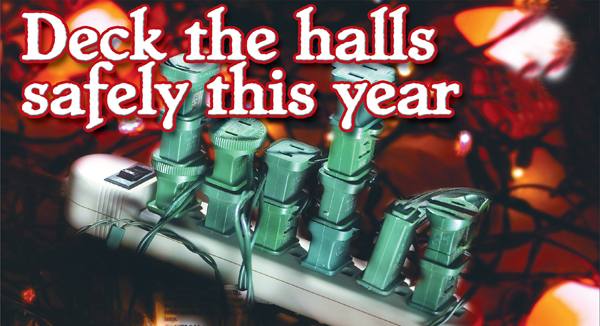Keeping families safe during the holidays

For most of us, the holiday season represents a time for family festivities and good cheer. What few of us consider is that the holiday season is a time when there is an increased risk of home fires and other injuries. The Kansas Office of the State Fire Marshal (OSFM) and Safe Kids Kansas reminds parents and caregivers to take a few precautions when decorating for Christmas, Hanukkah, Kwanzaa and other winter festivities.
“Christmas trees, candles and holiday decorations significantly contribute to the seasonal causes of home fires,” said Doug Jorgensen, Kansas Fire Marshal. “Add to that the hectic nature of the holidays, when people are trying to accomplish multiple tasks at one time, and the chance for home fires grows even more.”
Holiday celebrations often include cooking or baking. It’s important to know that unattended cooking is the leading cause of home fires and home fire injuries in the United States. Most cooking fires involve the stovetop, so keep your counter space nearby free from anything that can catch fire. Turn off the stove when you leave the kitchen, even if it’s for a short period of time. If you’re simmering, boiling, baking or roasting food, check it regularly and use a timer to remind you that you’re cooking. Also, create a “kid-free zone” of at least three feet around the stove and areas where hot food and drinks are prepared or carried.
Candles are widely used in homes throughout the holidays, and December is the peak month for home candle fires. According to the National Fire Protection Association’s (NFPA), two out of every five home decoration fires are started by candles. Consider using flameless candles, which look and smell like real candles, and will keep children safe from burns. If you do use traditional candles, keep them at least 12” away from anything that can burn, and remember to blow them out when you leave the room or go to bed.
If you decorate a tree, be sure to take these precautions:
- Never leave a lit Christmas tree or other decorative lighting display unattended. Inspect lights for exposed or frayed wires, loose connections and broken sockets. Do not overload extension cords or outlets and do not run an electrical cord under a rug.
- Decorative lighting should be labeled with the seal of an independent testing lab. If it’s not labeled for outdoor use, don’t use it outdoors
- Natural Christmas trees always involve some risk of fire. To minimize the risk, get a fresh tree and keep it watered at all times or consider an artificial tree. Do not put the tree within three feet of a fireplace, space heater, radiator or heat vent. LED lights burn cooler than incandescent lights and pose a lower risk of fire.
- Do not burn Christmas tree branches, treated wood or wrapping paper in a home fireplace.
- Never leave burning candles unattended. Don’t put candles on a tree or a natural wreath, or near curtains or drapes. Keep matches and lighters locked out of reach. Battery-operated flameless candles are an alternative that does not have a fire risk.
- Have working smoke detectors on every level of your home and in every sleeping area.
Safe Kids Kansas tips to prevent accidental poisoning:
- Keep alcohol (including baking extracts) out of reach and do not leave alcoholic drinks unattended. Don’t forget to store all medications, including those for children, out of reach.
- Color additives used in fireplace fires are a toxic product and should be stored out of reach. Artificial snow sprays are also harmful if inhaled.
- Holly berries, mistletoe berries, poinsettias, amaryllis, boxwood, Christmas rose, Crown of Thorns, English ivy and Jerusalem cherry are all potentially harmful if eaten. If a child eats any part of a non-food plant, call the Poison Control Center at 800-222-1222.
- Have furnaces inspected annually, and install carbon monoxide detectors in your home.
”If children will be spending time in your home this season, do some basic childproofing in advance,” said Cherie Sage, Safe Kids Kansas. “For example, keep ornaments and other decorations that have small parts, metal hooks or look like food out of reach of small children.” Simple precautions can help ensure your family stays home for the holidays, and out of the Emergency Department.
For more helpful safety information, visit www.nfpa.org/holiday or www.safekids.org.








